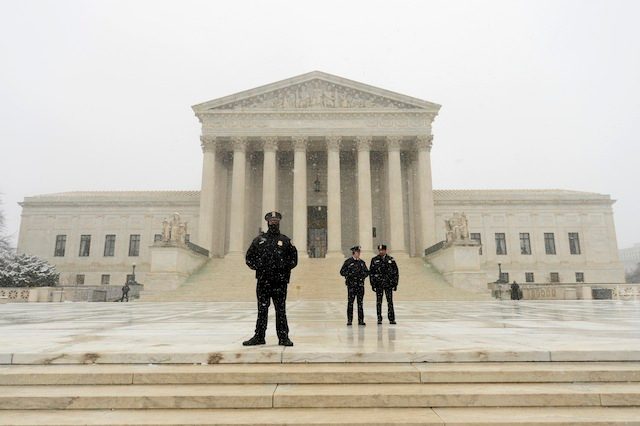SUMMARY
This is AI generated summarization, which may have errors. For context, always refer to the full article.

WASHINGTON DC, USA – A sharply divided US Supreme Court weighed the future of “Obamacare” for a second time in 3 years Wednesday, March 4, after a new challenge to the contentious healthcare reform.
The law, US President Barack Obama’s crowning domestic achievement, seeks to make health insurance available to a broad cross-section of Americans, for whom health care is often too expensive or otherwise inaccessible.
In June 2012, the first time the Supreme Court considered a challenge to Obamacare, its conservative Chief Justice John Roberts helped save the measure by voting alongside the four more progressive justices.
The president’s Republican foes have tried various tactics to repeal the law, but their latest challenge in the US high court focuses on the wording of a statute of the law that governs federal tax subsidies for people who sign up for Obamacare coverage.
The narrow question before the court is whether some 7 million people who signed up for Obamacare via the government’s website are actually entitled to tax subsidies that make the coverage affordable.
Legal scholars say that a ruling against the tax credits provision would eviscerate the law so thoroughly that it would be tantamount to striking down the measure altogether.
Predictably, the nine justices seemed to divide again roughly along partisan lines, although Roberts, who asked hard-hitting questions of both sides during the case three years ago, sat sphinx-like throughout Wednesday’s arguments, saying almost nothing.
Judge Sonia Sotomayor, one of the more left-leaning members of the high court, warned that striking down the provision could lead to a “death spiral that this statute wanted to avoid.”
‘Never-ending saga’
Another liberal court member, Elena Kagan, spoke wearily about the “never-ending saga” of court challenges to Obamacare.
“It took a year and a half to notice this language,” she said of the challenge made by the plaintiffs in the case long after the measure was passed, signed and in effect.
Equally adamant, however, was Justice Samuel Alito, who suggested he could not ignore critical language missing from the nearly 900 page law.
“Why didn’t they say, ‘established under the state,” or “established within the state,’ Alito asked. “Why didn’t they do that?”
Another justice, Anthony Kennedy, often the fulcrum of the court who sometimes sides with liberals and sometimes with conservatives, posited that invalidating the statute would raise “a serious constitutional problem” if citizens suddenly found themselves without subsidized insurance.
In later remarks however, Kennedy seemed troubled by the “ambiguity” in the wording of the Obamacare measure, suggesting perhaps that he might after all be open to striking it down.
A vote to do so would find him in the company of the court’s bloc of three most conservative members who are certain to go against the Obamacare again this time – Justices Antonin Scalia, Clarence Thomas and Alito.
The Affordable Care Act, passed in 2010, came into force in January 2014.
Since then, Americans without health insurance have been able to obtain insurance through their home state or the federal Department of Health and Human Services, which set up the healthcare.gov website.
But out of the 50 US states, 34 – most of which are Republican governed – have refused to create state health insurance “exchanges” or online marketplaces, requiring their residents to sign up for Obamacare on the federal government’s website.
In addition to the two cases that sought to essentially strike down the entire law, in a case won last year by Obamacare foes, the Supreme Court decided that employers did not have to pay for contraception for employees if it runs against their own religious convictions.
Arguing the case for the plaintiffs was Michael Carvin, while the government’s case was presented by Solicitor General Donald Verrilli, who earned praise from the White House for “making a strong case to the court about the constitutionality of the law and the clear reading that we believe is there,” White House spokesman Josh Earnest said.
“The solace that we take from this – and that everybody who’s watching at home should take from this – is that the law is really clear,” Earnest said, despite efforts “to contort it to mean what the plaintiffs in this case want it to mean.” – Chantal Valery, Agence France-Presse / Rappler.com
Add a comment
How does this make you feel?
There are no comments yet. Add your comment to start the conversation.